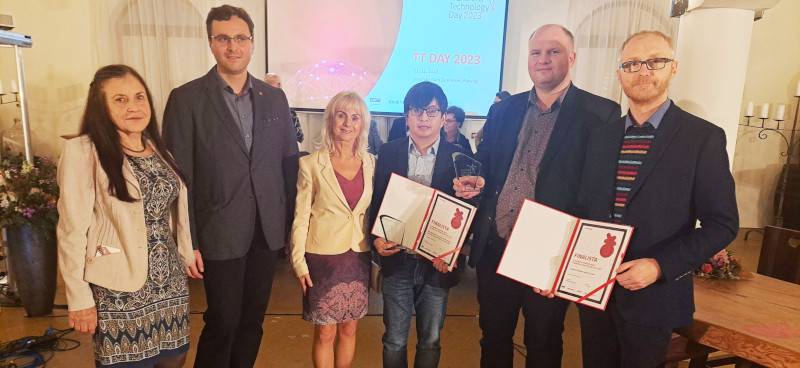
Two Technologies from TBU Made It to the Finals of Transfera Technology Day
23. November 2023On Tuesday 21 November 2023, another edition of the Transfera Technology Day contest took place in the municipality of Rakvice in the Hodonín region. This year, 28 technologies from 13 Czech institutions submitted their projects. The best among them were selected by an expert jury composed of representatives of research institutions and of investors.
A total of 12 projects advanced to the finals, among them two projects submitted by Tomas Bata University in Zlín. The first of the runner-ups from TBU was a project entitled “Method of Preparation of Gel-Type Polymer Electrolyte for Lithium-Sulphur Battery”, which was presented by Dr. Tomáš Sáha. “The world-wide use of lithium-sulphur (Li-S) batteries continues to grow. However, the batteries currently used show deficiencies in impregnation with a non-aqueous solution that contains electrolytic salt. For this reason, we have focused on a solvent-free formulation in a photo-initiated cross-linking reaction, which enables the preparation of environmentally friendly gel polymers. Moreover, the use of simple equipment and undemanding operating conditions translates into low production costs,” says Dr. Tomáš Sáha.
The other finalist coming from the Zlín-based university was the “Flexible Contact Temperature Sensor” project, which is being implemented by Assoc. Prof. Radek Stoček and his team at the Centre of Polymer Systems. “Technological products are mainly cyclically loaded and tend to heat up enormously. Depending on the type of material used for the production of the product, the heating intensity also changes. As heating increases, the material of the product is degrading faster. Therefore, it is necessary to know exactly the course of the heating values of the material from which the product is made,” says Radek Stoček, adding: “Currently, a heating analysis can be performed using non-contact infrared sensors, but this method is demanding in terms of analysis conditions, and, if these are not fulfilled, the measured values may be completely wrong. An accurate method is the contact temperature measurement, but this cannot be performed on a cyclically loaded material, because there is no sensor capable of deforming itself along with the deformation of the material being measured. Therefore, the presented technological solution comprises a flexible contact sensor for continuous temperature measurement on surfaces of bodies in which the position or geometry of the analyzed object changes over time due to the external force in action.”
“We are pleased that we are able to interconnect Czech science and technology and the business community and, thus, create suitable conditions for mutual cooperation. The Technology Transfer Centre of TBU in Zlín participates in the actual transfer to commercial practice. It is a difficult and long-lasting process nowadays, as it is not easy to find business partners. We are all the more pleased that we have managed to advance to the finals with two of our projects,” says Ing. Ivana Bartoníková, Director of the Technology Transfer Centre.
Palacký University in Olomouc became the winner of the contest, and that for their “AC-tive ENF – Innovative Needles for Electro-Acupuncture” project. Compared to commonly used passive acupuncture needles, the stimulation when such electro-needles are used is significantly more effective and, thanks to their special design, their application is also less painful and more suitable for children. Second place went to researchers from Masaryk University and their research on fluorescent enzymes. The so-called luciferases are enzymes that allow living organisms to produce light. Fireflies are a typical example. Experts from Brno have created an artificial enzyme that produces a much longer and more stable light than the natural one. As a result, the diagnosis and monitoring of selected diseases can be significantly improved, and further research can be facilitated. Third place went to the “Innovative Full Solenoid Valve” project submitted by the University of West Bohemia in Pilsen. This novelty stands out for being very simple and innovative – it has an extremely fast response and a low power consumption compared to conventional valves.
The national platform Transfera.cz has been operating in the Czech Republic since 2014. At present, the platform has thirty members coming from universities, research organizations and other entities. Its mission is, above all, to interconnect science and business, to support innovation and to negotiate with the state administration. At the same time, the platform also provides investors with a database of promising Czech research projects that can be applied on a global scale.